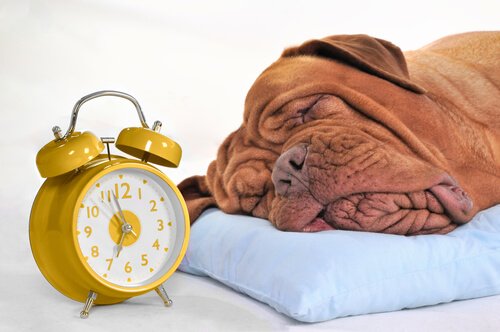What to Do if Your Pet Has Problems Sleeping


Written and verified by the lawyer Francisco María García
Problems sleeping not only happen to humans, but to animals as well. You shouldn’t worry too much at first if your pet has problems sleeping.
However, it’s a good idea to observe your dog to find out if they have an acute disorder, especially if it’s continuous. If so, you should consult with a trusted veterinary.
Animals are very sensitive to changes. New people being in the home or not having any companion in the home can get them upset. It’s necessary to give them time and to treat them with serenity and affection in order for them to get used to the new situation.
It’s possible that your pet’s sleeping problems are caused by stress. Animals can get stressed by the impact of some experience or negative event. In general, insomnia disappears after two or three days.
Some factors to consider if your pet has any problems sleeping
Routine and habits
Your pet’s routine is very important. Many times, pets are left home alone during the entire day. They usually get bored and spend most of their time sleeping.
Once their owner arrives, the animal wakes up, gets excited and doesn’t want to go back to sleep because they are only interested in playing. If this is happening to your pet, then their sleeping disorder is caused by their lifestyle.

These problems are solved by changing their routine. One solution is to take them to daycare so they can be entertained and remain active. Pets, especially dogs, need to get exercise. They will need to do this earlier in the day. That way, when they have to sleep, they will be tired and calm. Then, their insomnia will disappear.
If you notice that your friend does not get enough sleep, you can take certain measures to help him fall asleep; it would be a good idea to get him used to a routine, to keep the room at a comfortable adequate temperature and, if necessary, to use drugs prescribed by the veterinarian.
Temperature
In the winter and at the hottest point of summer, nocturnal insomnia in pets usually increases. Many animals are especially sensitive to the weather. If you suspect that this is the case with your pet, you can lower the inside temperature by using an air conditioner.
In the winter, a warm, cozy blanket will be great for your pet. A thermal blanket is good at keeping the area your pet sleep at warm. You can do this as long as you careful with the cables and plugs. If the heat is the problem, a fan or air conditioner will take care of it.

The effects of temperature are more noticeable in puppies. They have such an impact on them that you should allow your puppy to sleep close to you so that your body heat helps your them sleep. We also recommend wrapping a hot water bottle in a cloth and laying your puppy on top of it because it will help them fall asleep.
Habits that prevent insomnia
To fix or prevent your pet from having a sleeping disorder, it’s essential to form habits that help them fall asleep. What aspects should you take into consideration?
- Get them used to go to the bathroom before bedtime.
- Feed them dinner at least two hours before bedtime. This way, the animal will not feel weighed down by the food; he will have digested the food and will be better disposed to fall asleep.
- Do not forget to give him water. He must drink enough so that he is not thirsty during the night.
- Create a peaceful and quiet environment at home. There are animals that get nervous when all they hear is complete silence. In such cases, hearing some relaxing music while falling asleep will solve the problem. Leaving a watch nearby so the animal can hear its ticks can also be helpful.
Are your pet’s sleeping problems chronic?
Despite having made these changes in your pet’s environment and their insomnia does not disappear, there may be a medical reason behind it. There are diseases that cause animals to lose their sleep.
- Pain caused by the beginning stages of osteoarthritis can cause the animal not to sleep. Your veterinarian is, in this case, the one who can solve the problem and medicate your pet to lower their pain.
- Age is another factor to consider. As with humans, the older you are, the less you need sleep. In general, older animals have more problems falling asleep.
- It’s always possible to turn to medications. There are drug-based treatments that will help your pet sleep. You have to remember that the important thing is that the animal’s medication is prescribed by a specialist.
Problems sleeping not only happen to humans, but to animals as well. You shouldn’t worry too much at first if your pet has problems sleeping.
However, it’s a good idea to observe your dog to find out if they have an acute disorder, especially if it’s continuous. If so, you should consult with a trusted veterinary.
Animals are very sensitive to changes. New people being in the home or not having any companion in the home can get them upset. It’s necessary to give them time and to treat them with serenity and affection in order for them to get used to the new situation.
It’s possible that your pet’s sleeping problems are caused by stress. Animals can get stressed by the impact of some experience or negative event. In general, insomnia disappears after two or three days.
Some factors to consider if your pet has any problems sleeping
Routine and habits
Your pet’s routine is very important. Many times, pets are left home alone during the entire day. They usually get bored and spend most of their time sleeping.
Once their owner arrives, the animal wakes up, gets excited and doesn’t want to go back to sleep because they are only interested in playing. If this is happening to your pet, then their sleeping disorder is caused by their lifestyle.

These problems are solved by changing their routine. One solution is to take them to daycare so they can be entertained and remain active. Pets, especially dogs, need to get exercise. They will need to do this earlier in the day. That way, when they have to sleep, they will be tired and calm. Then, their insomnia will disappear.
If you notice that your friend does not get enough sleep, you can take certain measures to help him fall asleep; it would be a good idea to get him used to a routine, to keep the room at a comfortable adequate temperature and, if necessary, to use drugs prescribed by the veterinarian.
Temperature
In the winter and at the hottest point of summer, nocturnal insomnia in pets usually increases. Many animals are especially sensitive to the weather. If you suspect that this is the case with your pet, you can lower the inside temperature by using an air conditioner.
In the winter, a warm, cozy blanket will be great for your pet. A thermal blanket is good at keeping the area your pet sleep at warm. You can do this as long as you careful with the cables and plugs. If the heat is the problem, a fan or air conditioner will take care of it.

The effects of temperature are more noticeable in puppies. They have such an impact on them that you should allow your puppy to sleep close to you so that your body heat helps your them sleep. We also recommend wrapping a hot water bottle in a cloth and laying your puppy on top of it because it will help them fall asleep.
Habits that prevent insomnia
To fix or prevent your pet from having a sleeping disorder, it’s essential to form habits that help them fall asleep. What aspects should you take into consideration?
- Get them used to go to the bathroom before bedtime.
- Feed them dinner at least two hours before bedtime. This way, the animal will not feel weighed down by the food; he will have digested the food and will be better disposed to fall asleep.
- Do not forget to give him water. He must drink enough so that he is not thirsty during the night.
- Create a peaceful and quiet environment at home. There are animals that get nervous when all they hear is complete silence. In such cases, hearing some relaxing music while falling asleep will solve the problem. Leaving a watch nearby so the animal can hear its ticks can also be helpful.
Are your pet’s sleeping problems chronic?
Despite having made these changes in your pet’s environment and their insomnia does not disappear, there may be a medical reason behind it. There are diseases that cause animals to lose their sleep.
- Pain caused by the beginning stages of osteoarthritis can cause the animal not to sleep. Your veterinarian is, in this case, the one who can solve the problem and medicate your pet to lower their pain.
- Age is another factor to consider. As with humans, the older you are, the less you need sleep. In general, older animals have more problems falling asleep.
- It’s always possible to turn to medications. There are drug-based treatments that will help your pet sleep. You have to remember that the important thing is that the animal’s medication is prescribed by a specialist.
This text is provided for informational purposes only and does not replace consultation with a professional. If in doubt, consult your specialist.








